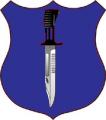Completely missed this!
Yes, yes and yes!
Use the wrong word and you'll see the wrong problem.
This fellow Maxwell is now on my "Natalie Portman and Swarfega" list of good things - as I have constantly cautioned against the "agenda monkeys" and said we should get as simple as it is useful to get! Now I don't care who gets the credit for saying it, as long as it gets said.Leaders should and, in fact must, listen to these researchers and academics but they must also consider the agendas of pundits who often have the loudest voices as they push their concepts and terminology. Rarely do any of these pundits call for a reduction and simplification of terminology, doctrine, and concepts. The “new ideas” they push are frequently recycled from past doctrine or accepted historical theories and simply repackaged – Counterinsurgency doctrine being a case in point.
I don't agree with all he says, but this is a major step forward. Bravo Maxwell!












Bookmarks